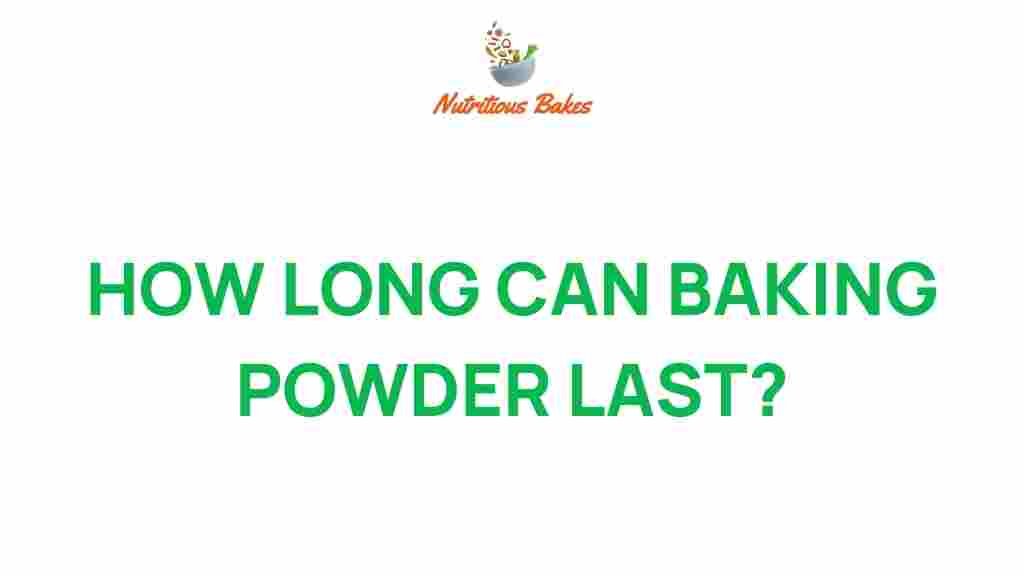Unveiling the Secrets: How Long Can Baking Powder Truly Last?
Baking powder is an essential ingredient in many kitchens, acting as a leavening agent that helps baked goods rise. However, many home bakers often overlook the importance of understanding the shelf life of baking powder. In this article, we will explore how long baking powder truly lasts, how to store it properly, and tips for ensuring your baking essentials remain fresh.
Understanding Baking Powder
Baking powder is a combination of an acid (usually cream of tartar) and a base (typically baking soda), along with a moisture-absorbing ingredient like starch. It works by releasing carbon dioxide gas when mixed with moisture and heat, which creates bubbles that help baked goods rise.
What Affects the Shelf Life of Baking Powder?
The shelf life of baking powder can be affected by several factors:
- Moisture: Exposure to moisture can cause baking powder to activate prematurely, leading to reduced effectiveness.
- Heat: High temperatures can degrade the chemical components of baking powder, shortening its lifespan.
- Light: Prolonged exposure to light can also affect the potency of baking powder.
How Long Does Baking Powder Last?
The average shelf life of baking powder is about 6 to 12 months when stored properly. However, this can vary based on the type of baking powder and the conditions in which it is stored.
Types of Baking Powder and Their Lifespan
- Single-acting baking powder: This type reacts once when mixed with a liquid. It generally lasts about 6 months after opening.
- Double-acting baking powder: This type reacts twice—once when mixed with a liquid and once when heated. It typically has a shelf life of 12 months after opening.
Checking the Expiration Date
Every container of baking powder should have an expiration date printed on it. It’s essential to check this date before using your baking powder, as expired baking powder may not provide the desired rise in your baked goods.
How to Test Baking Powder Freshness
To ensure that your baking powder is still effective, you can conduct a simple freshness test:
- Take 1 teaspoon of baking powder.
- Add it to 1/3 cup of hot water.
- If it bubbles vigorously, it’s still good to use. If there is little to no reaction, it’s time to replace it.
Proper Storage Techniques for Baking Powder
To maximize the shelf life of your baking powder, consider the following storage tips:
- Keep it dry: Store your baking powder in an airtight container to prevent moisture from getting in.
- Store in a cool place: Keep it in a cool, dark pantry away from heat sources such as the oven or stove.
- Label your container: If you transfer your baking powder to a different container, label it with the purchase date to keep track of its freshness.
- Avoid the fridge: Although it might seem logical, moisture in the fridge can actually shorten the shelf life of baking powder.
Kitchen Tips for Using Baking Powder
Here are some handy kitchen tips to keep in mind when using baking powder:
- Always measure accurately: Use a dry measuring spoon and level it off for the best results.
- Mix with dry ingredients: Combine baking powder with flour and other dry ingredients before adding liquids to ensure even distribution.
- Use it promptly: After adding baking powder to your batter or dough, bake it right away to take advantage of its leavening properties.
Troubleshooting Baking Issues
If your baked goods aren’t rising as expected, here are some troubleshooting tips:
- Check freshness: Always test your baking powder for freshness if your baked goods aren’t rising.
- Review your measurements: Double-check that you used the correct amount of baking powder.
- Consider the recipe: Some recipes may require adjustments to baking powder based on other ingredients used.
Common Questions About Baking Powder
Can I use expired baking powder?
Using expired baking powder is not recommended, as it may not provide the necessary leavening, leading to dense baked goods.
What can I substitute for baking powder?
If you find yourself out of baking powder, you can make a substitute using:
- 1/2 teaspoon baking soda mixed with 1 teaspoon of vinegar or lemon juice.
- 1/2 teaspoon baking soda with 1/4 teaspoon of cream of tartar.
Conclusion
In conclusion, understanding the shelf life and proper storage of baking powder is crucial for anyone who enjoys baking. By following the tips provided in this article, you can ensure that your baking essentials remain fresh and effective, helping you create delicious baked goods every time.
For more information on maintaining food freshness in your pantry, check out this guide on pantry staples. And remember, always keep an eye on your ingredients to ensure they’re performing at their best!
If you have any more questions or need further cooking guidance, don’t hesitate to reach out!
This article is in the category Tips and created by NutritiousBakes Team
